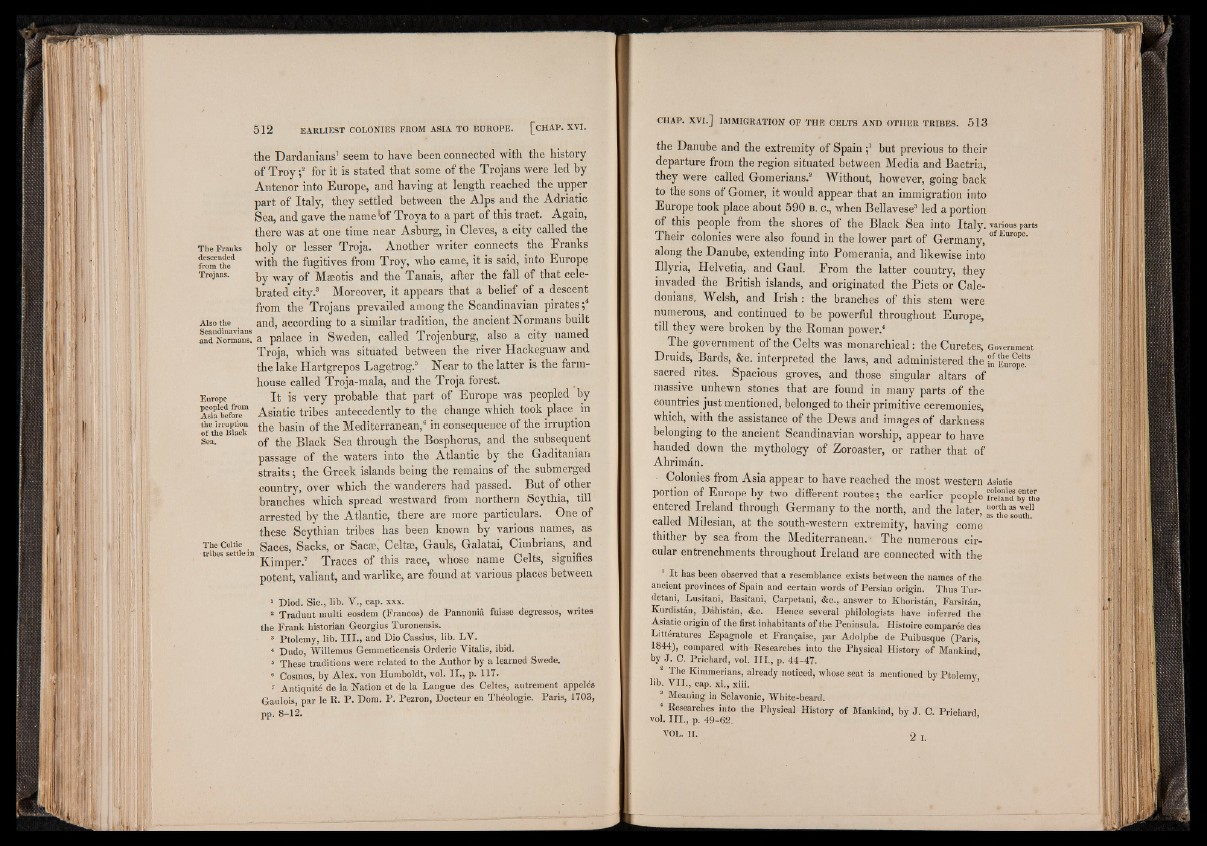
T h e Fran k s
descended
from the
Trojans.
Also the
Scandinavians
and JST ormans.
Europe
peopled from
A sia before
th e irru p tio n
o f th e Black
Sea.
T h e Celtic
tribes settle in
the Dardanians1 seem to have been connected with the history
of Troy;2 for it is stated that some of the Trojans were led by
Antenor into Europe, and having at length reached the upper
part of Italy, they settled between the Alps and the Adriatic
Sea, and gave the name*of Troya to a part of this tract. Again,
there was at one time, near Asburg, in Cleves, a city called the
holy or lesser Troja. Another writer connects the Franks
with the fugitives from Troy, who came, it is said, into Europe
by way of Mseotis and the Tanais, after the fall of that celebrated
city.3 Moreover, it appears that a belief of a descent
from the Trojans prevailed among the Scandinavian pirates ;4
and, according to a similar tradition, the ancient Normans built
a palace in Sweden, called Trojenburg, also a city named
Troja, which was situated between the river Hackeguaw and
the lake Hartgrepos Lagetrog.6 Near to the latter is the farmhouse
called Troja-mala, and the Troja forest.
It is very probable that part of Europe, was peopled by
Asiatic tribes antecedently to the change which took place in
the basin of the Mediterranean,6 in consequence of the irruption
of the Black Sea through the Bosphorus, and the subsequent
passage of the waters into the Atlantic by the Gaditanian
straits ; the Greek islands being the remains of the submerged
country, over which the'wanderers had passed. But of other
branches which spread westward from northern Scythia, till
arrested by the Atlantic, there are more particulars. One of
these Scythian tribes has been known by various names, as
Saces, Sacks, or Sacæ, Celtæ, Gauls, Galatai, Cimbrians, and
Kimper.7 Traces of this race, whose name Celts, signifies
potent, valiant, and warlike, are found at various places between
1 Diod. Sic., lib. V., cap. xxx.
3 Traduut multi eosdem (Francos) de Pannoniâ fuisse degressos, writes
the Frank historian Georgius Turonensis.
3 Ptolemy, lib. I I I . , and Dio Cassius, lib. LV.
4 Dudo, Willemus Gemmeticensis Orderic Vitalis, ibid.
5 These traditions were related to the Author by a learned Swede.
6 Cosmos, by Alex, von Humboldt, vol. I I ., p. 117.
? Antiquité de la Nation et de la Langue des Celtes, autrement appelés
Gaulois, par le R. P . Dom. P. Pezron, Docteur en Théologie. Paris, 1703,
pp. 8-12.
the Danube and the extremity of Spain but previous to their
departure from the region situated between Media and Bactria,
they were called Gomerians.2 Without, however, going back
to the sons of Gomer, it would appear that an immigration into
Europe took place about 590 b . c ., when Bellavese3 led a portion
of this people from the shores of the Black Sea into Italy. various parts
Their colonies were also found in the lower part of Germany, ofEurope-
along the Danube, extending into Pomerania, and likewise into
Illyria, Helvetia,, and Gaul. From the latter country, they
invaded the British islands, and originated the Piets or Caledonians,
Welsh, and Irish : the branches of this stem were
numerous, and continued to be powerful throughout Europe,
till they were broken by the Roman power.4
The government of the Celts was monarchical : the Curetes, Government
Druids, Bards, &c. interpreted the laws, and administered the Europe!5
sacred rites. Spacious groves, and those singular altars of
massive unhewn stones that are found in many parts .of the
countries just mentioned, belonged to their primitive ceremonies,
which, with the assistance of the Dews and images of darkness
belonging to the ancient Scandinavian worship, appear to have
handed down the mythology of Zoroaster, or rather that of
Ahrimân.
■ Colonies from Asia appear to have reached the most western Asiatic
portion of Europe by two different routes ; the earlier people îrdaùd byuL
entered Ireland through Germany to the north, and the later,
called Milesian, at the south-western extremity, having come
thither by sea from the Mediterranean. ■ The numerous circular
entrenchments throughout Ireland are connected with the
1 I t has been observed that a resemblance exists between the names of the
ancient provinces of Spain and certain words of Persian origin. Thus Tur-
detani, Lusitani, Basitani, Carpetani, &c., answer to Khoristin, Farsi tan,
Kurdistan, Dâhistàn, &c. Hence several philologists have inferred the
Asiatic origin of the first inhabitants of the Peninsula. Histoire comparée des
Littératures Espagnole et Française, par Adolphe de Puibusque (Paris
1844), compared with Researches into the Physical History of Mankind'
by J . C. Prichard, vol. I I I ., p. 44-47.
3 The Kimmerians, already noticed, whose seat is mentioned by Ptolemv
lib. V II., cap. xi., xiii.
3 Meaning in Sclavonic, White-beard.
4 Researches into the Physical History of Mankind, by J . C. Prichard
vol. I I I ., p. 49-62